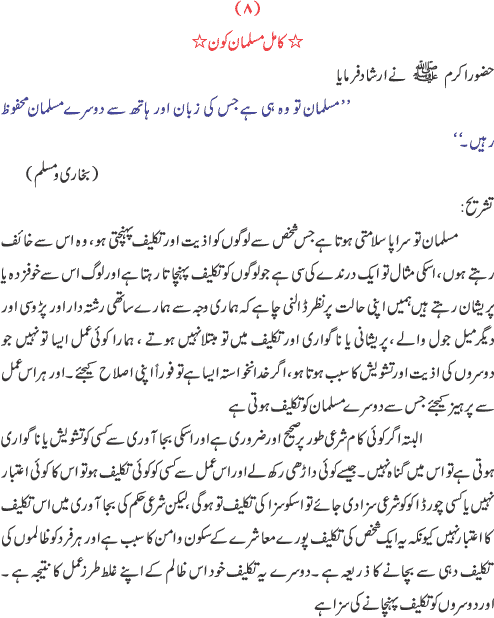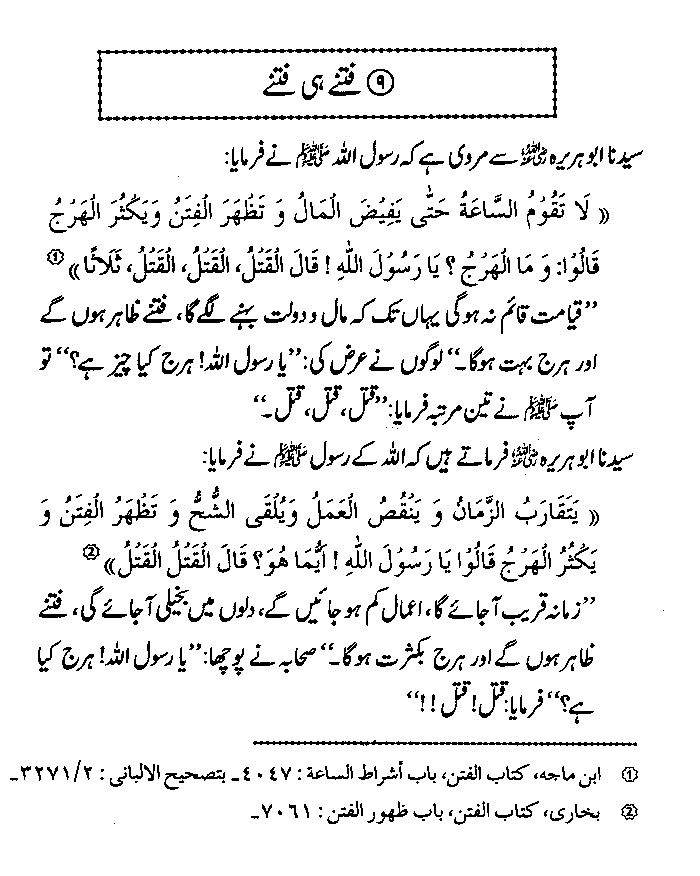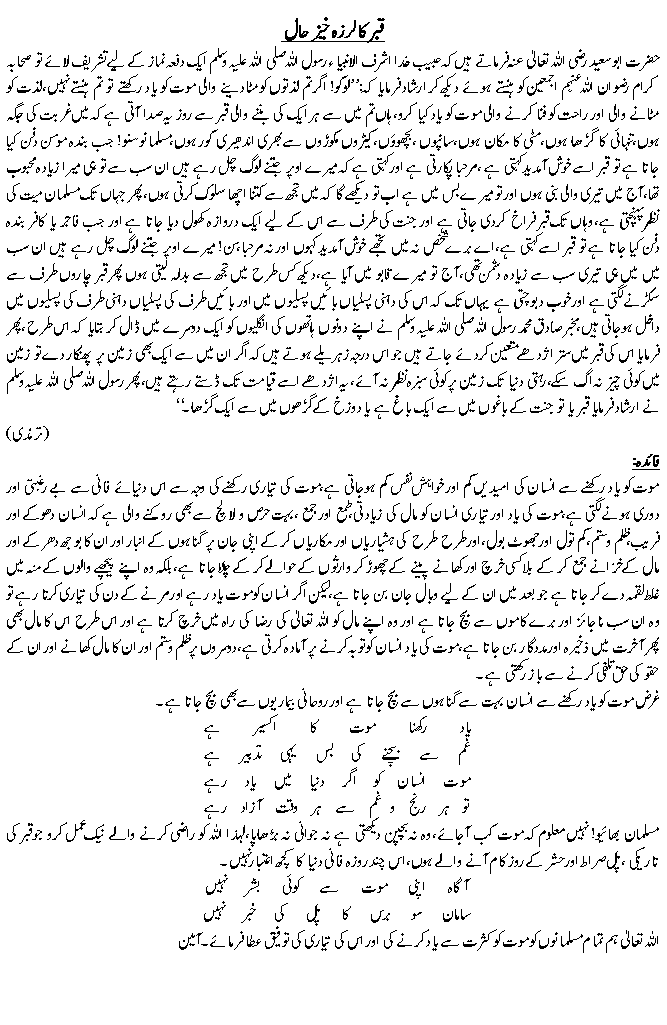
Kamil Musalman Kon?
Death Is A Reality, Not Philosophy
FIRST of all, let me point out that the afterlife is not a philosophical matter in Islam. It is a reality that every Prophet sent to mankind (peace be upon them all) has warned his people about. There are numerous references to the Hereafter in the Qur’an and the Ahadith of Prophet Muhammad (peace be upon him). Many descriptions and warnings about the Day of Judgment can be found in both sources and we, as Muslims, take them to be fact, not conjecture or philosophy.
A belief in life after death in Islam is a pillar of faith. It is the main rationale for the religion of Islam itself. In saying this, I mean that there is not much point for Allah in giving us the beautiful gift of Islam as a way of life if there is no continuation of life in the Hereafter.
If there were no belief in the Hereafter, people would feel free to do as they pleased, at least to the limits that other people would set for them and enforce. They would only have their personal desires as a guide for behavior and belief. They would not feel accountable for the deeds that are hidden from the knowledge of society. A belief in the Hereafter helps us to keep in mind that there is a God, Allah, and He has prepared a great reward for those who do good and severe punishment for those who only follow their selfish desires.
Death is actually just a transitional point, where we leave this worldly life and enter into a different, everlasting life. For some – I ask Allah that we would all be in this category In sha Allah – the next life is a pleasant existence, which is much better than we could even ever imagine it could be. For others I ask Allah that none of us would end up in this category – the next life is a terrible existence, which is unimaginable in its torments.
The Day of Judgment is a fixed day in the future when everyone will be brought to stand before their Creator, Allah, to account for all that they did in their life.
Those who believed in Him and observed righteousness will be rewarded and those who were irresponsible and did evil deeds will be punished severely. Many people, however, have already passed away and are still waiting for the Day of Judgment in their graves.
For those who believed and did well in this life, their graves will be spacious and well-lit. Their deeds will come to them in the form of a handsome attendant who will speak kindly and keep them company till the Day of Judgment. From their graves, they will be able to see their place in Paradise. They will beg Allah to bring the Day soon so that they can receive their reward as soon as possible.
For those who did not believe in Allah or did evil in this world, their grave will be very dark, narrow, and crampling so much so that they will feel their ribs crossing over each other in the middle of their chest. Their deeds will come to them in the form of an ugly and mean attendant. From their graves, they will be able to see their place in Hellfire. They will beg Allah not to bring the Day of Judgment so that they would not suffer what is in store for them.
There is a wealth of information available to those who would like to know more about this key issue for all of mankind. All we need to do is read the Qur’an and books of Hadith that deal with this subject. The truth about the next life is easily accessible in these two sources.
- September, 11
- 2515
- Paradise-Hell
- More
Hajj And Tawheed
Allah, the Almighty says in the Holy Qur’an, “And whoever respects the signs of Allah, this surely is (the outcome) of the piety of hearts.” (22:32)
Respecting the signs of Allah means inculcating Tawheed in each and every act of worship in its full magnitude, so that one may gain Taqwa. It is now the blessed season of Hajj, when people travel long distances to perform this noble task. Therefore it is up to the person that this act becomes an act of worship and not just a tiring journey, with no spiritual benefits. This act must coincide with the divine saying of our God “The pilgrimage is (performed in) the well-known months; so whoever determines the performance of the pilgrimage therein, there shall be no intercourse nor fornication nor quarreling amongst one another; and whatever good you do, Allah knows it; and make provision, for surely the provision is the guarding of oneself, and be careful (of your duty) to Me, O men of understanding.” (2:197)
One must undertake this journey to gain the tremendous reward mentioned in the following Hadith..
“He who came to this House (the Ka’bah) (with the intention in performing Hajj) without speaking or committing indecencies, would return (free from sin) as on the day his mother bore him.” (Muslim, 2/3129)
This is the one chance for a person to display before Allah, his humility in the utmost sense in words, action and appearance. This is the main purpose of his creation. Allah, the Most Gracious, the Most Merciful says in the Qu’ran : “And I have not created the jinn and the men except that they should worship Me.” (51:56) Here worship means showing humility or being humble.
Before commencing the journey one must do some brain-storming. Like one must ask themselves, what are the internal per-requisites one must instill before saying, “ Here I come O! Allah”? Is our Hajj in accordance to the Sunnah of our beloved Prophet (peace be upon him)? Does it fulfill the demands of Tawheed? What is the connection of ‘Laailaha Illallah’ and the Talbiya which one repeats over and over again in Hajj?
The Method of Slaughtering Animal
1. The method of slaughtering an animal is that the animal should be placed on the ground with the face towards the qiblah. The person should take a sharp knife, recite Bismillahi Allahu Akbar and cut the neck of the animal in such a manner that four veins (or passage ways) are cut off. They are: the air passage, the gullet, and the two jugular veins which are on either side of the gullet and the air passage. If only three out of these four are cut, the slaughter will be valid and the animal will be halaal. If only two of the four are cut, the animal will be considered to be dead and it will not be permissible to consume the meat of such an animal.
2. At the time of slaughtering the person intentionally did not take the name of Allah Ta’ala. The animal will be considered to be dead and it will be haraam to consume it. But if a person forgets to take the name of Allah Ta’ala, the animal will be halaal.
3. It is makruh to slaughter an animal with a blunt knife as this causes much suffering to the animal. It is also makruh to begin skinning, cutting, and breaking the hands and feet of the animal before it can become cold (meaning, before it can become lifeless). Similarly, it is makruh to continue cutting the animal’s neck after having cut the four passageways.
4. At the time of slaughtering a fowl, its entire neck got cut off. It is permissible to eat such a fowl, and not makruh. However, it is makruh to slaughter the fowl in such a manner, although consuming it is not makruh.
5. Slaughtering of an animal by a Muslim is permissible under any condition. This is irrespective of whether the Muslim is a male, a female, in a state of purity or in a state of impurity. In all conditions, an animal slaughtered by a Muslim is halaal. An animal slaughtered by a non-Muslim is haraam.
Fitney Hi Fitney

Fitney Hi Fitney
Do Not Shed Blood Of Muslims
Narrated by Abdullah (Radhiallaho anho): Allah’s Messenger (sallallaahu ‘alaihi wasallam) said, “The blood of a Muslim who confesses that none has the right to be worshiped but Allah and that I am His Apostle, cannot be shed except in three cases: In Qisas for murder, a married person who commits illegal sexual intercourse and the one who reverts from Islam (apostate) and leaves the Muslims.“ Sahih Al-Bukhari Vol. 9 : No. 17
Killing an innocent non-Muslim under Muslim protection
Narrated by Abdullah bin Amr (Radhiallaho anho): Allah’s Messenger (sallallaahu ‘alaihi wasallam)said, “Whoever killed a Mu’ahid (a person who is granted the pledge of protection by the Muslims) shall not smell the fragrance of Paradise though its fragrance can be smelt at a distance of forty years (of traveling).” Sahih Al-Bukhari Vol. 9 : No. 49
Muslim Shahada
[ALLAH’S Quran – 49:15] “Indeed, true believers are those who have solemnly believed in Allah and His Messenger…..”
The Prophet (Peace Be Upon Him) has said :
[Muslim, Book #001, Hadith #0043] “It is narrated on the authority of Ubadah b. Samit that the Messenger of Allah (may peace be upon him) observed: He who said:” There is no god but Allah, He is One and There is no associate with Him, that Muhammad is his servant and His Messenger, that Christ is servant and the son of His slave-girl and he (Christ) His word which He communicated to Mary and is His Spirit, that Paradise is a fact and Hell is a fact, “Allah would make him (he who affirms these truths enter Paradise through any one of its eight doors which he would like.”
[Muslim, Book #001, Hadith #0045] “It is narrated on the authority of Sunabihi……………. I heard the Messenger of Allah (may peace be upon him) say: He who testifies that there is no god but Allah and that Muhammad is the messenger of Allah, Allah would prohibit the fire of hell for him.”
[Muslim, Book #001, Hadith #0051] “It is reported on the authority of Anas b. Malik that the Prophet of Allah (may peace and blessings be upon him) addressed Mu’adh b. Jabal as he was riding behind him to which he replied: At thy beck and call, and at thy pleasure, Messenger of Allah. He again called out: Mu’adh, to which he (again) replied: At thy beck and call, and at thy pleasure. He (the Holy Prophet) addressed him (again): Mu’adh, to which he replied: At thy beck and call, and at thy pleasure, Messenger of Allah. Upon this, he (the Holy Prophet) observed: If anyone testifies (sincerely from his heart) that There is no god but Allah, and that Muhammad is His bondsman and His Messenger, Allah immuned him from Hell.”
[Bukhari, Book #55, Hadith #644] “Narrated ‘Ubada: The Prophet said, “If anyone testifies that None has the right to be worshiped but Allah Alone Who has no partners, and that Muhammad is His Slave and His Apostle, and that Jesus is Allah’s Slave and His Apostle and His Word which He bestowed on Mary and a Spirit created by Him, and that Paradise is true, and Hell is true, Allah will admit him into Paradise with the deeds which he had done even if those deeds were few.” (Junada, the sub-narrator said, ” ‘Ubada added, ‘Such a person can enter Paradise through any of its eight gates he likes.“)
Concept Of Friendship In Islam
Humans are social creatures by nature; they’re always in need of friends and companions. Most of our lives depend on interaction with others. Strong individuals are the core of a strong community, something that Muslims should always strive for.
We all know that Allah the Most High has brought us to life in order to test us. Thus we are here for a relatively short period of time and we shall meet Allah one Day, so we need to use our present life for what is best for us in the hereafter.
Once we know our purpose and our goal in life, we should seek ways to achieve them so as to benefit our own selves.
In an authentic Hadith, Prophet Mohammad (Sall’Allahu alaihi wasallam) said: “A person is likely to follow the faith of his friend, so look whom you befriend.”
Prophet Mohammad (Sall’Allahu alaihi wasallam) who has the noblest character and dealings with fellow humans gave us a very clear and simple message and advice in regard to friendship.
How should we choose our friends?
We should choose a friend that believes and abide by our religion (Islam) and gives great respect to what Allah and Prophet Mohammad (Sall’Allahu alaihi wasallam) has ordered us. And we should stay away from that who is not well mannered and gives no attention to what Islam is about or what pleases or displeases Allah, for he’ll surely affect us negatively.
There is no good in the companion that drowns us in sins and displeases Allah. The bases for the actions of those who follow the evil ways are corrupt; their actions are built upon misguidance and deviation. Their deeds are worthless to them as Allah (Subhanuhu wa Ta`ala) says: “And We will proceed to what they have done of deeds, so We shall render them to scattered floating dust.” Qur’an (25:23)
Their actions, even if we see them as righteous and noble are of no value to them, so how can they be useful to us? Good friends are those who share their companions both their happiness and sadness.
If we share our feelings with the wrong-doers whose actions are worthless and based on corruption, then we are following the same ways and standards as they are, and we’ll end up being as corrupted as they are, and then we’re in big trouble, how can we face Allah’s dissatisfaction and displeasure?
Instead of making friends with the misguided ones we should befriend the righteous, yet treat the rest in a gracious and just manner. Staying at a sufficient distance is necessary; yet treating everybody in a noble and kind manner is required. In another Hadith, Prophet Mohammad (Sall’Allahu alaihi wasallam) said: “The example of a good companion and a bad companion is like that of the seller of musk, and the one who blows the blacksmith’s bellows. So as for the seller of musk then either he will grant you some, or you buy some from him, or at least you enjoy a pleasant smell from him. As for the one who blows the blacksmith’s bellows then either he will burn your clothes or you will get an offensive smell from him.”
When choosing our friends we should ask ourselves first: Are they going to help us achieve the purpose for which we were brought to life? or will they take us away from it? Will they desire for us Allah’s pleasure or is that completely irrelevant to them and not their concern at all? Are they leading us to Paradise or to Hell?
Allah (Subhanuhu wa Ta`ala) says in Noble Qur’an: “O you who believe! Take care of your own selves. If you follow the right guidance and enjoin what is right and forbid what is wrong no hurt can come to you from those who are in error. The return of you all is to Allah, then He will inform you about (all) that which you used to do.” (The Noble Qur’an- 5:105)
- September, 5
- 4175
- Human Rights
- More
Qaber Key Lerza Kheez Ahwal

Qaber Key Lerza Kheez Ahwal
The Mindset Of A Believer
Hazrat Thaanwi (Rahmatullahi Alayh) mentioned: The spirit one needs to constantly have is how can one be of service to the creation and how can one’s actions be a means of preserving Deen. We should not do things to earn popularity among people. As far as popularity is concerned, we should hope and desire that people do not even come to know of our good works carried out during our lifetime, and nor should the people speak of our good deeds after our demise. (Malfoozaat-e-Hakeemul Ummat 10/19)
This Worldly Life is like a Dream
Hazrat Shaikh, Moulana Muhammad Zakariyya Saheb (Rahmatullahi Alaihi) while explaining the reality of this worldly life mentioned:
“This worldly life can be likened to a person who finds himself in an air-conditioned room being massaged by many servants while others are at his beck and call anxiously waiting to serve him. Suddenly his eyes open and he realizes that what he was visualizing was nothing but a dream and in reality, he is in a prison cell stuck behind bars. On the other hand, another person sees himself in a dream while being severely beaten and lashed, undergoing difficulty upon difficulty. When his eyes open, he sees himself safe and sound and realizes that all the pain and suffering was nothing but a dream. He feels relieved and is grateful to Allah Ta’ala that what he was going through was just a dream and not a reality. Hazrat Shaikh then mentioned to those present in the gathering: Respected friends! This world is identical to a dream. When a person opens his eyes (i.e. the eyes of the Hereafter), then only will he realize in which condition he truly is. In the Hereafter when those that lived a comfortable life in the world will see the immense rewards in store for all those servants of Allah Ta’ala who bore afflictions and underwent difficulties in this world, they will desire that if only their bodies were cut with scissors in the world and they were made to undergo a great amount of hardship and difficulty so that they may also be worthy of the great rewards of the Aakhirat. (Malfoozaate Hazrat Shaikh 1/67)

